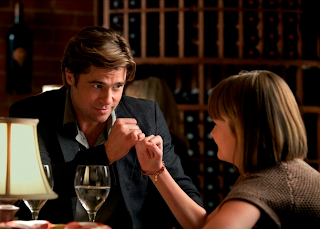"We are card counters at the blackjack table. We're gonna turn the odds on the casino."
That is perhaps the closest that Bennett Miller's new film gets to the snappy and rapid-fire intensity of "The Social Network", another film written by Aaron Sorkin. Although "Moneyball" has had the imprint of a cacophony of other writers, it bares the strongest mark of the recent awards winner. This is a far degree from that previous writing venture, but don't expect me to spend all my time griping that it's not as good as "The Social Network". These two are vastly different films that share that similar feeling. There are plenty of things that this film has in its favor.
"Moneyball" isn't a film I was really too eager to see, so the response I had to it was somewhat positive for my expectations. It's set on the backdrop of the world of baseball, but it's oddly enough not really about baseball. It deals more with what the sport, at its best, represents. Brad Pitt plays Billy Beane, a former baseball player whose luck didn't pan out, and now he's general manager of the ill-budgeted Oakland Athletics. He's the odd man out at the discussion table, with scouts of the old generation of baseball throwing around superficial nitpickery about players. "He has an ugly girlfriend. Ugly girlfriend means no confidence", states one geezer superficially.
Beane comes across Jonah Hill's Peter Brandt, in real life Paul DePodesta, a similarly under-appreciated economics major. Billy sees value in Brandt, like the two of them will soon see value in other undervalued players, and hires him aboard. Brandt introduces a large table of statistic, which play mostly to give off an intelligent impression to the viewer. Smart viewers will understand it and appreciate it. Dumb viewers will try to understand it, and applaud the film for being smart. Ultimately I saw those numbers boiled down to bare essentials. A bunch of brilliant players sidelined for small defects. It's a simple underdog story at the center of it, despite all the statistical banter.
Director Bennett Miller definitely puts in a great deal effort to not make this a simple baseball film. Like Beane himself, he cares less about the game and more about the endgame. How does this all come together in the end, either to impress or emote? What physical, psychological, and emotional responses does the film raise in viewers? That's the essential question in any film, and Miller studies that aptly. The problem, as stated slightly before, is in the script. With so many writers, skilled and whatnot, leaving an impression on it, it was bound to be a scattershot piece. There's a sense that the script isn't exactly on the right terms with itself.
Sorkin feigns charisma more often than he duplicates it or creates it. You get the impression that he thought his dialogue was somewhat wittier than it actually was. Enough moments of phony confidence come and go, in part due to the characters themselves. If it weren't for the actors, I think I'd have written them off entirely. They all do solid, if simple, work. Pitt plays that sort of beaten hound, exuding confidence more effectively than his dialogue. His work here, physically and emotively, resembles some of Peter Dinklage's work in "Game of Thrones" this past year. That's as strong a recommendation as I can give.
Hill is pliable to the role of Peter Brandt, giving his strongest performance to date, but that's not saying too much. It's a step in a decidedly non-comedic direction for the actor, and it's impressive whenever somebody stretches himself like that. Phillip Seymour Hoffman serves as background as Art Howe, the coach of the team. He's good in his scenes, but hardly anything to really watch out for. His scenes don't exactly sparkle. If there's an actor I think really rises to the call, it's Chris Pratt as Scott Hatteberg. He just has this deep honesty about him, and if he had the same amount of screentime as Pitt, he'd be as much in the conversation here.
All this aside, good or bad, the real star of "Moneyball" is Wally Pfister, better known as Christopher Nolan's regular D.P.. While it may seem like mild insanity, Pfister's work here is his most effective and beautiful to date. He's given a tighter canvas than in the past, focusing around car rides, baseball fields, and office spaces. His work is straight-forward in dialogue scenes, but he puts such a strong effort on lighting up the characters' faces to show the darker contrasts in them. There are plenty of beautifully colored and hypnotically wide shots here and there. A few single shots stand out. The most incendiary moment of the film, in many ways the climax, spreads across several different shots, each as effective in the whole as the last.
Without Pfister's brilliant stylings, most of the moments in this film would've felt stale or old hat. Pfister is the most riveting player here, and if he doesn't earn another nomination this year, it should serve as some sort of cruel hate crime. In fact, I'd have preferred him win for this than his relatively ordinary work in "Inception". As a whole, "Moneyball" is almost an appropriate companion to "The Help" in terms of a similar underdog-fighting-the-system plotting and quality, if a few notches higher. It feels longer than "The Help", even though it isn't. You feel that length most in the beginning, and it distracts from the rest of the film so slightly. Still, the film had me dabbing my eyes from time to time, overwhelmed with emotion. Other times, a sensory overload headache. You win some. You lose some.




No comments:
Post a Comment